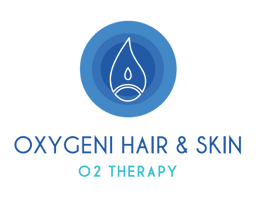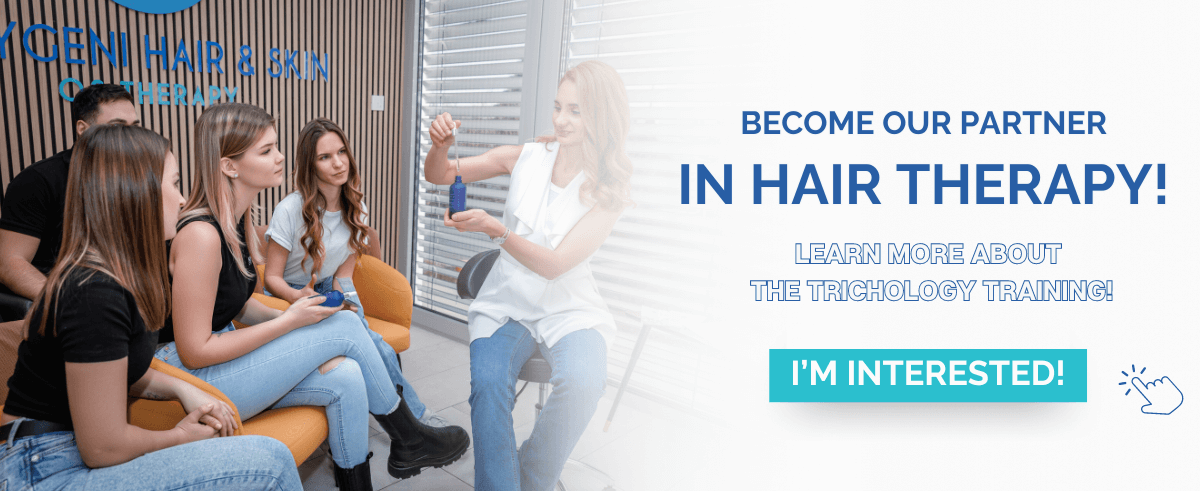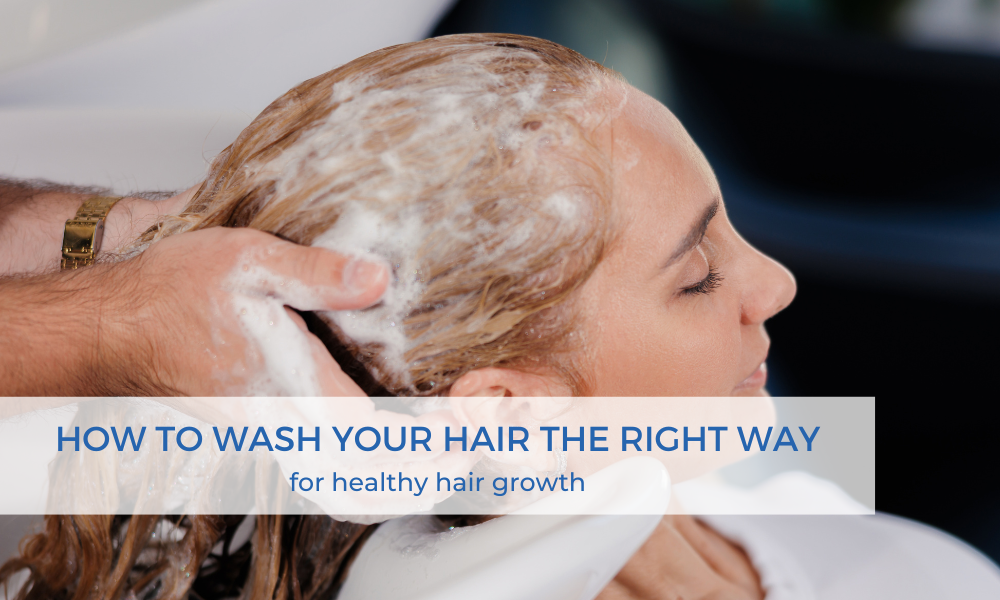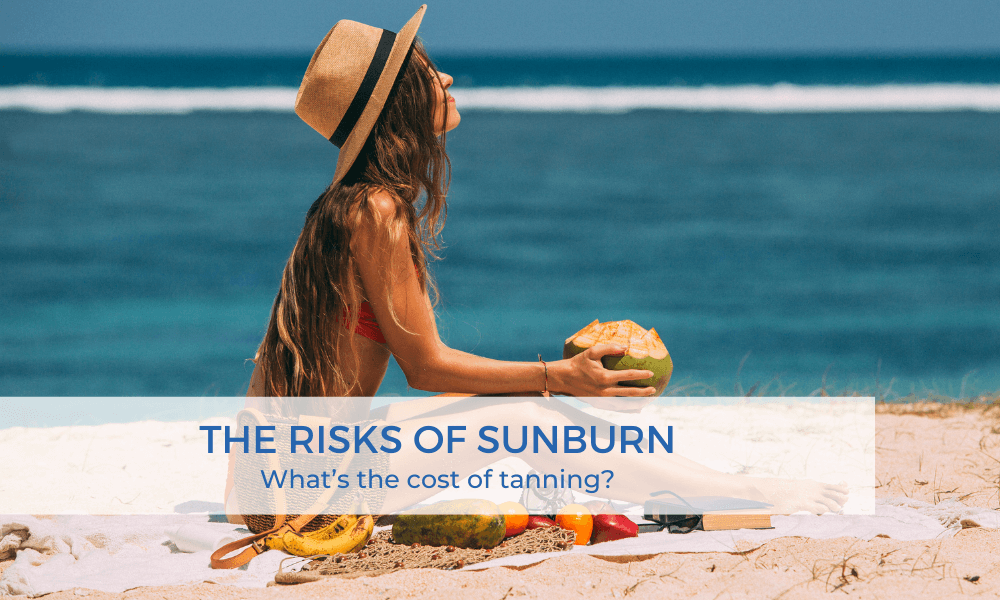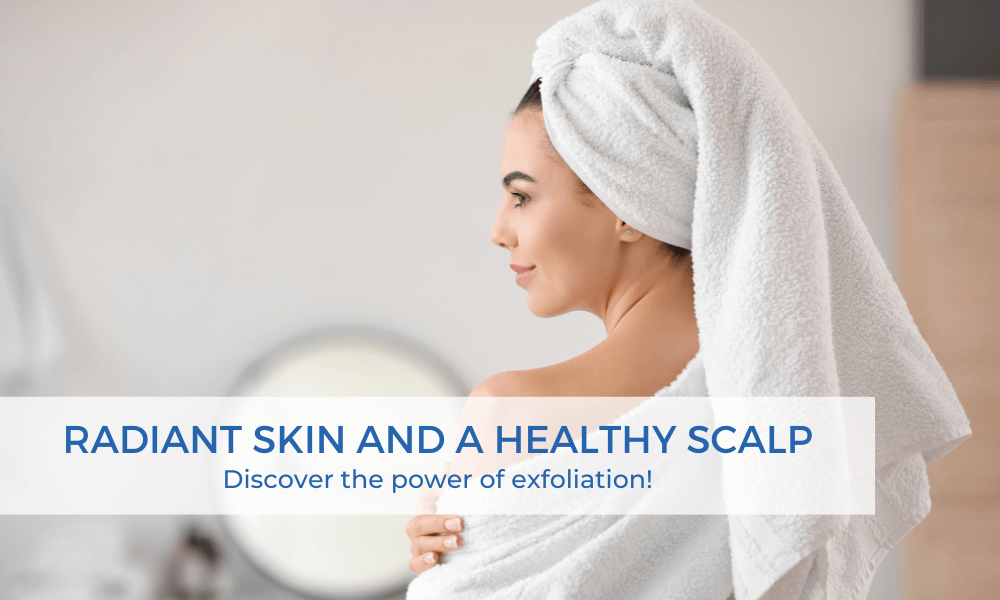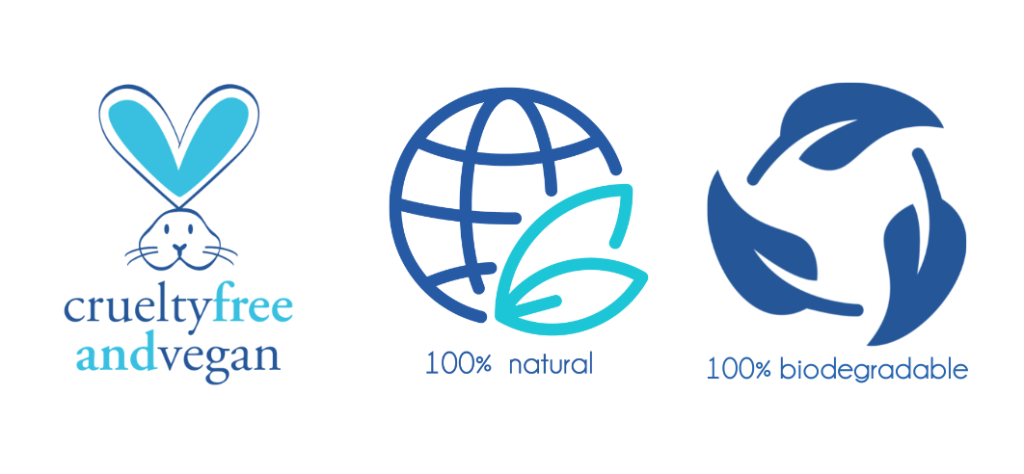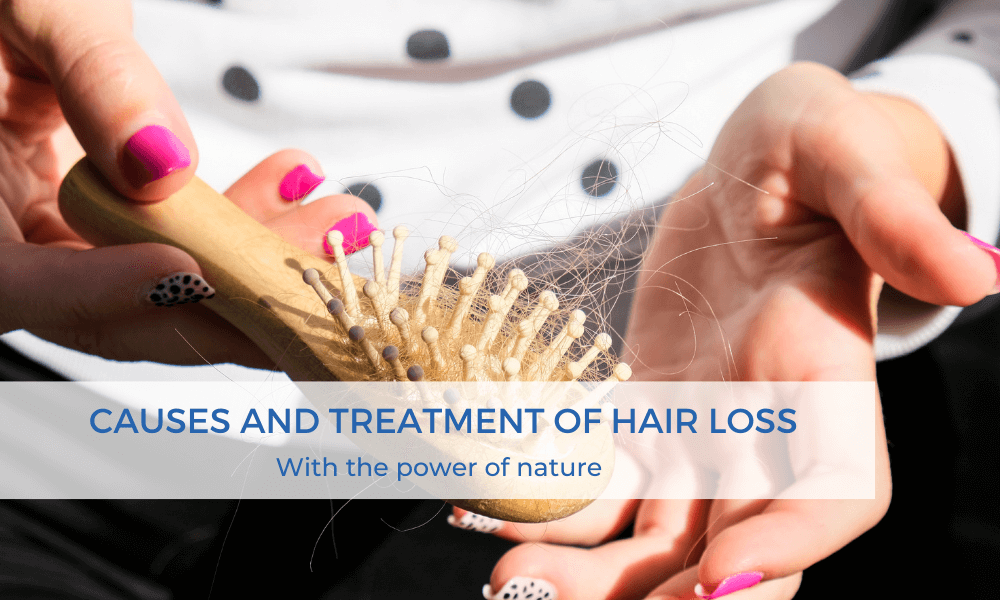
CAUSES AND TREATMENT OF HAIR LOSS
Hair loss is the most common hair-related issue, so it’s no wonder there’s a lot to read about its causes and treatment options. However, many questions and doubts arise regarding it. Cutting through the confusion, our article offers an in-depth exploration of hair loss, debunking myths, and providing clear guidance for those seeking accurate information. Additionally, we share what our hair care specialists recommend for the treatment and prevention of hair loss.
IT MATTERS HOW YOUR HAIR FALLS OUT
Hair loss is just an umbrella term because there are numerous types of hair loss known. The type of hair loss often indicates what causes it. Before considering hair loss as a severe condition, let’s clarify that there’s normal hair loss and pathological hair loss. Normal hair loss is a result of a natural physiological process, the final phase of the hair’s life cycle. Pathological hair loss refers to hair loss in excess of the norm, where significantly more hair falls out daily. But we’ll discuss this in detail later.
It’s important to realize that hair loss often signifies more than just itself: it can be both a cause and a symptom of other conditions. Any alteration affecting the hair and scalp changes the individual’s appearance, thereby influencing their self-perception, potentially leading to serious anxiety or personality problems. On the other hand, hair loss can be an initial indication of severe illnesses.
HAIR LOSS AND RELATED ISSUES
Hair loss can be both a symptom and a cause, so we need to thoroughly examine the mental, physical, and existing body conditions that might underlie hair loss (of course, only if you consider your hair loss to be chronic). The following questions can help you learn more about the possible causes of your problem to ensure the successful treatment of hair loss:
- Have you had any surgeries or chronic illnesses before?
- Do you have any nail abnormalities concurrent with hair loss?
- Have any unusual symptoms or previously unexperienced diseases emerged alongside hair loss?
- For women: Is there any correlation between your menstrual cycle and hair loss? Have you recently given birth? Are you taking oral contraceptives, and if not anymore, when did you stop?
- Have any diseases (thyroid, liver, kidney) been discovered in the last 3 months?
- Have you been on a diet recently?
- What medications, herbal remedies, or vitamins have you been taking in the past six months?
- Are the hair strands falling out from the roots, or are they breaking? Do you notice any hair regrowth?
- Have you had your hair permed or dyed recently?
- Have any emotional problems, traumas, or stress characterized your recent period?
PATCHY, DIFFUSE, OR PROPORTIONAL HAIR LOSS – WHERE IS IT FROM?
So, there are many types of hair loss depending on its extent and manner. The most common is male-pattern baldness, known as androgenetic alopecia. Hair thins out on the temples, forehead, and crown, and with each hair cycle, the strands become thinner and shorter until they become weak and almost colorless, resembling fuzz. This process starts in men at the age of 18, while in women, it occurs later, after the age of 30.
In diffuse hair loss, the area of hair loss cannot be determined; hair falls out proportionally from everywhere. Hair loss during pregnancy and the postpartum period usually falls into this category. Due to the high estrogen levels during pregnancy, many hair follicles remain in the growth phase longer than usual. After childbirth, due to the decrease in estrogen levels, these hairs fall out simultaneously before they can strengthen. Diffuse hair loss is expected at 8 weeks postpartum and only normalizes months later. Women who stop taking birth control pills may experience similar hormonal changes and consequent hair loss.
Patchy hair loss affects more and more people, both men and women. In this case, one or more bald spots develop. Usually, the hair grows back in these areas after two years.
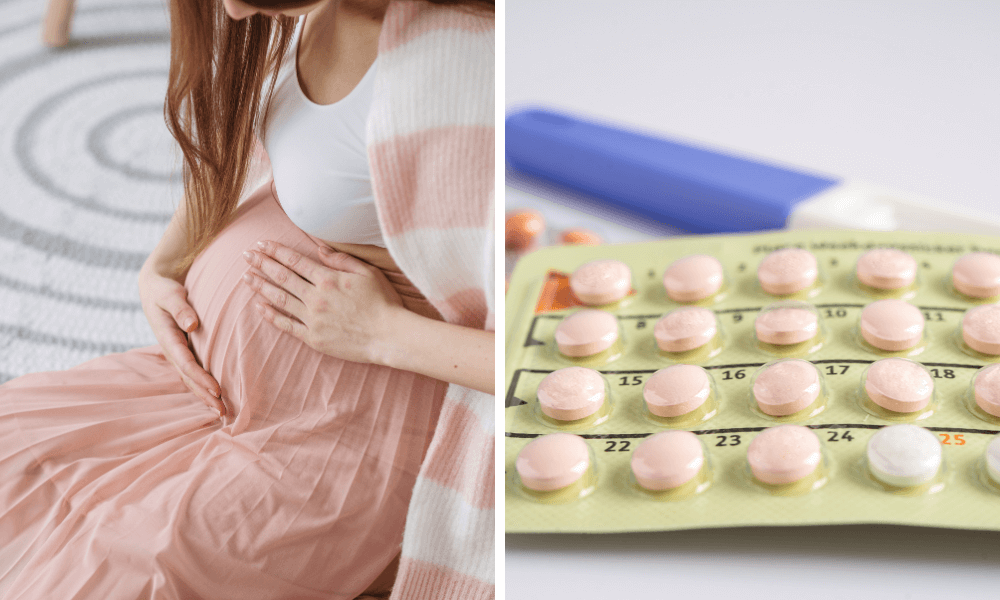
WHAT MAKES MY HAIR FALL OUT?
Hair loss can have numerous causes, but let’s look at the most common ones! It’s essential to try to confront all possible factors and circumstances that could have led to intense hair loss and, considering these, make important changes for the treatment of hair loss!
It’s common for scalp problems to underlie hair loss. Excessive scalp oiliness can also lead to hair loss – we’ve written more about this HERE – but bacterial infections and fungal growth can also be the cause. Thyroid disorders, sudden weight loss, iron and zinc deficiencies, and digestive problems, illnesses can also cause chronic hair loss. If you suspect such problems, consult a specialist!
As mentioned earlier, hair loss can intensify after pregnancy or stopping birth control pills, but it can also occur after surgery or drug treatment. Seasonal, spring-autumn hair loss, and hair loss associated with the menstrual cycle are also common. However, it’s more challenging if stress, trauma, and emotional problems underlie hair loss. Intense hair loss can occur due to exam periods, stressful work environments, personal problems, or even more severe depressive periods.
Physical, bodily changes or mental, and psychological factors can trigger any type of hair loss and changes observed on the scalp. It’s important to, in such cases, assess your situation and condition, seek professional help, and request laboratory tests. If you need assistance in taking the first steps, ask for help from a hair specialist who can provide guidance based on your hair diagnosis to help determine the problem more accurately!
WHO IS MOST PRONE TO INTENSE HAIR LOSS?
Unfortunately, nowadays, few are immune to the danger of intense hair loss. The primary reason for this is that we lead stressful lives, often overextend ourselves, fail to provide adequate attention and rest to our bodies, and, regrettably, our hair care routines often need improvement. Hair care products rich in chemicals are indeed one of the most common culprits behind hair loss. So, we can expect hair loss to occur not only in those specific cases we mentioned earlier but also in most of the people who don’t pay enough attention to their lifestyles and habits.
Smoking, excessive alcohol consumption, a fatty diet, sugary foods, sweets, inadequate intake of vitamins, and lack of exercise significantly increase the risk of hair loss. In summary, oxidative stress is the most common factor we are all exposed to, and if left unchecked, it can cause intense hair loss.
WHAT IS OXIDATIVE STRESS, AND HOW IS IT RELATED TO HAIR LOSS?
Oxidative stress is the most powerful degenerative process in living cells. It is responsible for aging, the development of malignant tumors, nerve damage, joint diseases, and inflammation. During oxidative stress, free radicals are formed, weakening the immune system, damaging DNA, and ultimately leading to cell death — resulting in symptoms such as pathological hair loss.
WHAT CAUSES FREE RADICALS TO FORM?
Free radicals are promoted by, among other things, indulgences such as alcohol, cigarettes, strong UV radiation, ozone, smog, various toxic substances in food and the environment, intake of polyunsaturated fatty acids (e.g., margarine, animal fat, hard cheeses, meat, etc.), excessive sugar consumption, as well as hunger, stress, cold environments, and immobility. Physiological processes within the body can also release free radicals, such as increased metabolic rates or significant physical exertion.
It is clear that a change in lifestyle is essential for everyone, not just those struggling with hair loss!
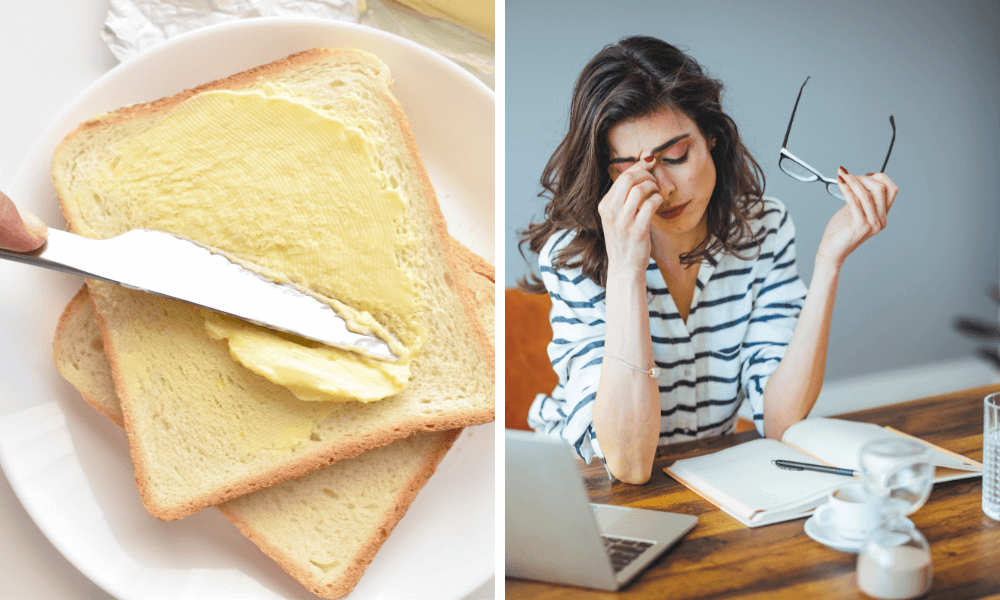
HAIR LOSS AND ITS TREATMENT - 6 MYTHS!
1.) IT'S HEREDITARY!
In reality, it’s not the disease itself that’s hereditary, but only the predisposition, which can be activated by the aforementioned environmental factors. Genetic factors account for 10-15%, with the rest being associated with lifestyle and the environment! Genetic traits can be prevented if action is taken in time!
2.) ANTI-HAIR LOSS SHAMPOO
A shampoo cannot work miracles, even if it’s labeled as an anti-hair loss product. The primary function of shampoo is cleaning, and our hair needs more than that. After cleaning, we need to moisturize and nourish our scalp with vitamins and minerals so that it gets everything it needs, similar to how our Earth’s soil works!
3.) INTENSIVE HERBAL TREATMENT
Herbs are not harmless plants. In the case of sensitive, irritated scalps, it is not advisable to use herbal shampoos or masks as they can act aggressively and can cause scalp problems, leading to hair loss. Treat your scalp gently if it’s sensitive!
4.) COUNTING DAILY SHED HAIR STRANDS
Counting how many hair strands fall out daily to determine if our hair loss is pathological can be very misleading. With curly or hard-to-manage hair, if we can’t comb our hair properly, we can get rid of several hundred previously shed but still entangled hair strands during one washing session. Counting our daily shed hair strands can be so psychologically burdensome that it may worsen rather than help diagnose hair loss. The extent of normal hair loss varies from person to person.
5.) COVERING IT UP WITH A HAT
If we have patchy hair loss or notice signs of male pattern baldness, we usually try to cover up the problematic area. Whether we need to or not, we wear hats or caps, which are extremely harmful to our scalp. If we don’t let our scalp breathe — of course, not during the winter — our hair loss can become even more intense because our scalp needs air and oxygen, which we deprive it of in such cases.
6.) ONE SHAMPOO SOLVES THE PROBLEM
Hair loss is not a problem like dry hands that we can solve with a cream or oil + aloe vera mix in moments. We may wash our hair with expensive shampoo, but let’s not expect miracles from it if we eat fried potatoes several times a week and don’t exercise. Our lifestyle, varied diet, and regular physical activity, including sports, have a positive effect on our entire body, including our scalp.
BAD HAIR CARE HABITS THAT CAN CAUSE HAIR LOSS
- Not drying your hair after washing it
- Not thoroughly washing your hair
- Washing your hair every day
- Washing your hair too infrequently
- Using inadequate hair care products
- Using hair care products rich in chemicals
- Blow-drying your hair with hot air
- Washing your hair with hot water
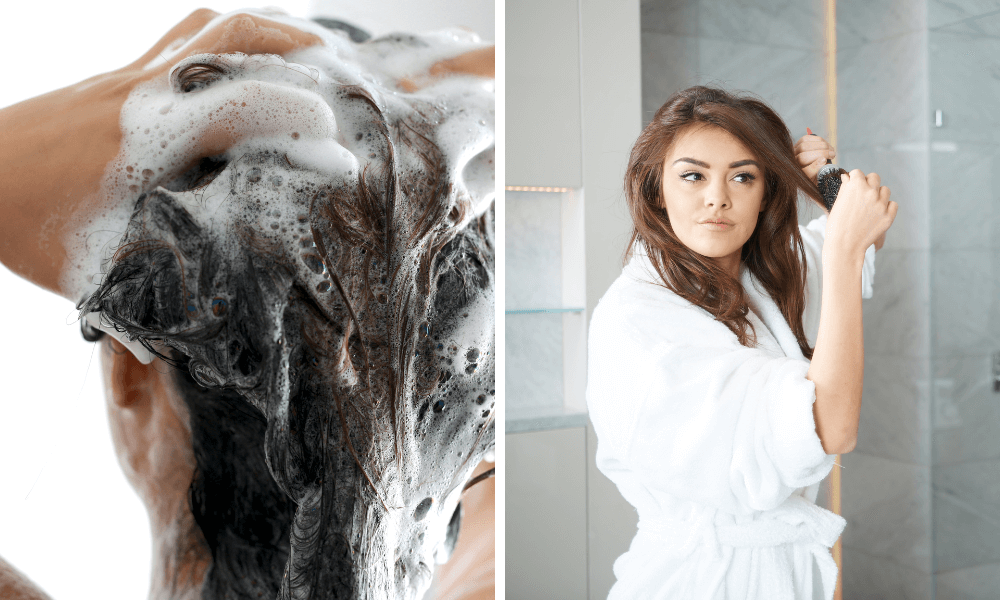
TREATMENT OF HAIR LOSS WITH THE POWER OF NATURE!
VITAMINS, TRACE ELEMENTS, MINERALS
- IRON
One of our most important minerals, essential for the formation of the blood’s oxygen-carrying protein, hemoglobin, and for the functioning of several enzymes and the immune system. We obtain iron through our diet, and its absorption and storage are quite complex processes. Iron deficiency can occur due to inadequate intake, excessive blood loss, pregnancy, or dieting. Iron deficiency anemia can lead to weakness, fatigue, hair loss, and paleness. It is important to replenish iron during hair loss treatment!
The main natural sources of iron: liver, beef, legumes, spinach, Swiss chard, lettuce, dried fruits, and beer (yeast).
- ZINC
Every cell in our body needs zinc. Besides maintaining healthy skin and hair, it participates in immune system function, hormone regulation, promotes wound healing, and is effective in treating certain skin diseases. Daily requirement: about 12 milligrams. Severe deficiency is fortunately rare, but mild deficiency can lead to hair loss, delayed wound healing, increased susceptibility to infectious diseases, and dry, cracked, flaky skin.
The main natural sources of zinc: meats, eggs, cheese, seafood, nuts, almonds.
- SELENIUM
An antioxidant mineral essential for maintaining healthy hair and nails. Daily requirement: about 60-70 micrograms. Its numerous beneficial effects are primarily due to its antioxidant properties and its essential role in many important processes as part of enzymes. Its most important effects include protection against cataracts and the degeneration of the sharp vision area (the so-called macula) in the retina, as well as strengthening the immune system. A deficiency can lead to hair loss, brittle nails, increased risk of immune system diseases, and fetal developmental abnormalities during pregnancy. Areas with selenium deficiency have an increased incidence of cancer.
The main natural sources of selenium: seafood, meats, brown rice.
- VITAMIN C
Its main effects include strengthening hair capillaries, being one of the components of collagen fibers in the skin’s second layer (the dermis), and aiding in the absorption of iron. Additionally, it has numerous other essential effects. Daily requirement: about 40 milligrams, 80 milligrams for smokers. Certain illnesses can increase the daily requirement. Overdosing can lead to kidney stones and stomach problems. In its absence, hair loss can occur, making vitamin C indispensable in our diets.
- VITAMIN A
From vitamin A, so-called retinoids are formed, which are essential for our vision, as well as for the health of our skin and hair, and for a series of vital processes (integrity of mucous membranes, immune system function, growth, bone and teeth structure, etc.).
The main natural sources of vitamin A: fish, egg yolks, liver, milk.

- VITAMIN B - B-7 Biotin
Among the B-vitamins group, biotin is the most important for our hair and skin. Biotin is found in abundance in many foods, so its deficiency in the body is rare. If deficient, nails become brittle, and hair loss occurs.
The main natural sources of biotin: liver, nuts, rice, legumes, and cauliflower.
- DIATOMACEOUS EARTH
Diatomaceous earth is a high-silica mineral powder, which is a vital element of all cells in the body, including connective tissues, bones, skin, liver, kidneys. It strengthens the immune system and aids in digestion and metabolic recovery. It also strengthens our hair and nails, so if you struggle with weak, thinning hair, a diatomaceous earth treatment can help a lot.
- HERBS
The beneficial effects of herbs are well known to everyone. We often consume herbal teas that help purify our bodies, boost metabolism, have anti-inflammatory and soothing effects, and strengthen our immune systems. We recommend yarrow tea with anti-inflammatory effects, lemon balm for beneficial effects on digestion and calming, cat’s claw tea as an excellent immune booster, and antioxidant green teas for digestion improvement.
- TURMERIC
The herb is known for its excellent anti-aging, rejuvenating, and regenerating effects. It regulates sebaceous gland function, stimulates blood circulation, supports collagen production. Its skin rejuvenating effect is also extremely effective for our hair, as its effects extend to our scalp when consumed internally.
OILS
Several studies have proven that coconut oil, olive oil, and jojoba oil not only restore hair structure but also prevent further hair damage, which is important for effective hair loss treatment. Additionally, they prevent hair dryness and breakage, so if time permits, prepare an oil treatment at home. Choose cold-pressed, natural, chemical-free oils, which can be applied to your hair with a carrier product. Try Oxygeni Hair natural oils, whose absorption is facilitated by Aloe Vera Gel.

GREEN DIET
Green plants – salads, cabbage, spinach, and all kinds of raw, green vegetables – have an alkalizing effect, which is extremely important for our bodies. Additionally, a plant-based diet has a mood-enhancing, energizing effect, replenishing our minds and souls. Let’s try to consume less meat and animal fat and focus more on raw foods, vegetables, and regular consumption of quality grains (quinoa, bulgur).
WHAT ELSE CAN YOU DO AGAINST HAIR LOSS?
NATURAL HAIR CARE
Avoid hair care products enriched with chemicals, silicones, sulfates, parabens, and other harmful substances that clog pores and inhibit hair follicles’ function. Choose gentle natural hair care products containing natural ingredients! You can order our 100% natural hair loss complex products from Oxygeni Hair HERE.
HAIR LOSS TREATMENT WITH OXYGEN THERAPY
Most hair and scalp problems are caused by oxygen deficiency. Especially those living in cities, in smoggy-dusty environments are prone to hair loss and scalp diseases due to poor air quality and lack of oxygen. By providing proper oxygen, vitamin, and mineral supply to hair follicles, they can regain new life, and strengthen, and thicken hair strands!
Oxygen therapy hair care treatment is based on supplying oxygen, vitamins, and minerals to the scalp, thereby curbing chronic hair loss and effectively combating scalp diseases – which otherwise often lead to hair loss.
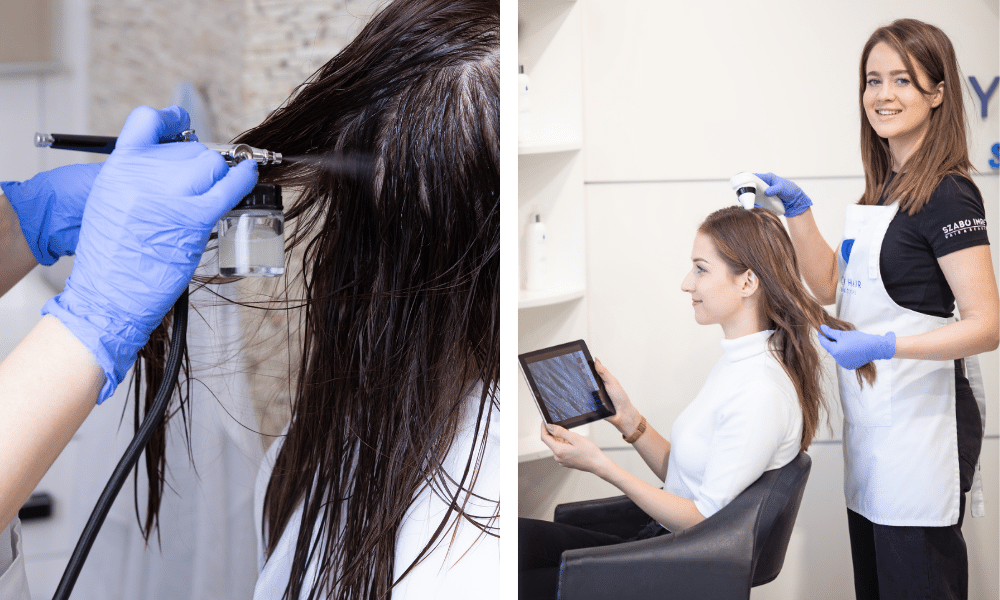
PHYSICAL ACTIVITY - STRESS RELIEF
It is very common for continuous stress and anxiety to lead to hair loss. In order to avoid this, it is worth exercising regularly. Yoga or running can be excellent solutions for this because while the former puts you in a state of relaxation, the latter helps to release accumulated tension.
CHOOSE A TRUSTWORTHY SALON!
What hair salon do you go to and what hair dye do they use? Proper hygiene conditions are extremely important for the health of the hair. A non-sterilized comb can be a source of many problems. But you also need to find out what bleach and hair dye your hairdresser uses. Are they using too strong bleach, which damages your hair and irritates your scalp? It is important to pay attention to details not only at home but also in the salon, and choose a hairdresser accordingly! If you want to be sure, look for a hair specialist who undoubtedly works under maximum hygiene conditions and pays attention to the health of your scalp and hair.
HAIR CARE ROUTINE RECOMMENDED BY OUR SPECIALISTS
You can do a lot for the health of your scalp and hair with the right hair care routine. It is important to use quality, chemical-free products that gently cleanse and nourish your scalp and hair without irritation. And for the best effect, follow the steps below, which can make hair loss treatment more effective and successful:
1.) CLEANSING
Shampooing is the first step in the hair care routine. If you are using Oxygeni Hair Loss Shampoo, dilute the shampoo with water before use as it is a concentrate. Wash your hair twice, gently massaging your scalp during washing. If the shampoo does not foam on your hair during the second wash, wash it for the third time. Then rinse thoroughly with lukewarm water.
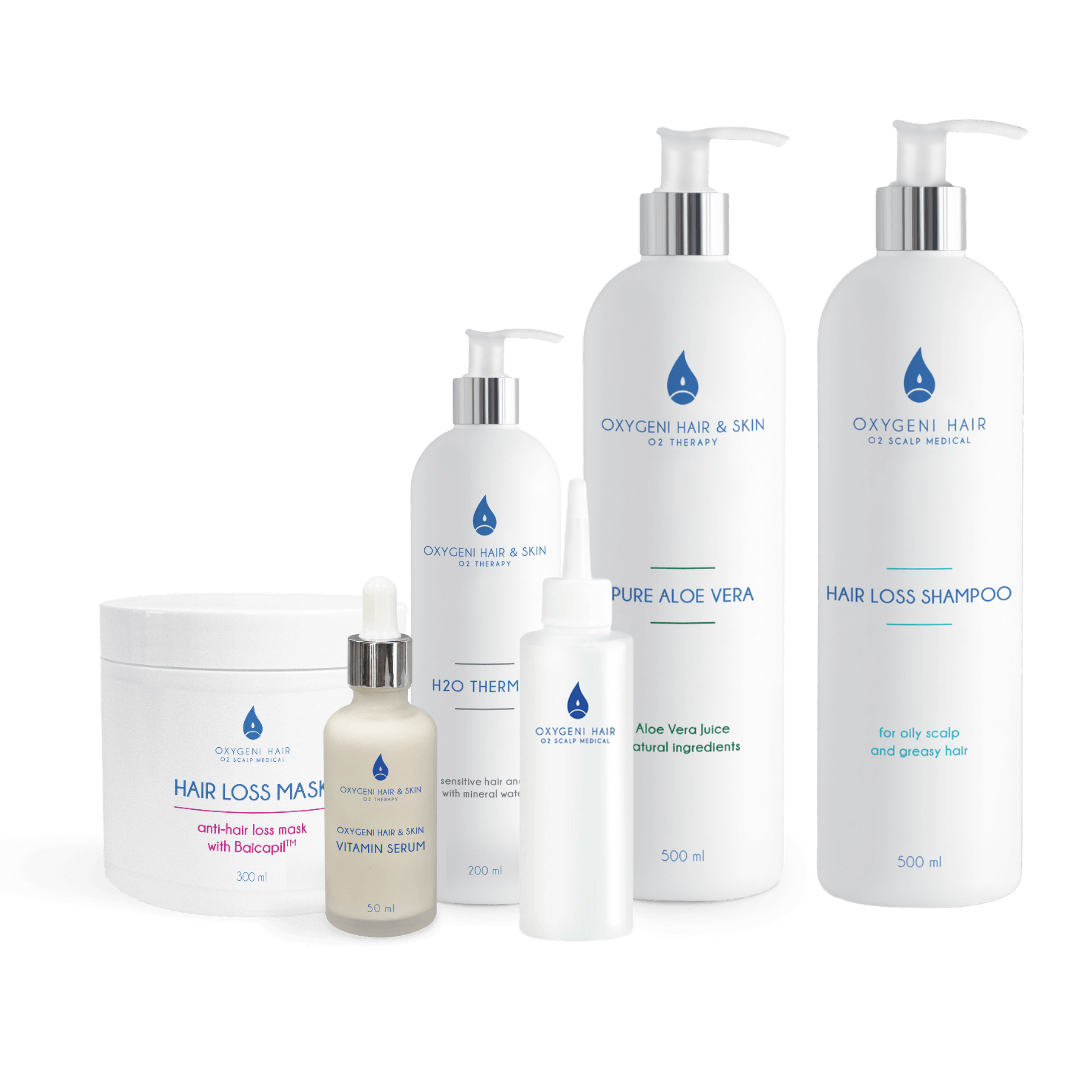
Complex Product Bundle Against Hair Loss
If you are looking for a more comprehensive solution and want to treat your hair loss as effectively as possible, then this bundle fro you! Naturally and effectively treat your scalp for lasting results. We recommend using Hair Loss Shampoo, Hair Loss Mask, Pure Aloe Vera, H2O Thermal, and Vitamin Serum together for hair loss, hair strengthening, and hair growth. Thanks to their 100% natural composition, the product package offers a long-term solution to scalp problems.
2.) TONING
During toning, you disinfect the scalp and in this step, you also get rid of any remaining impurities and excess sebum. Oxygeni Hair Tonic is anti-inflammatory and moisturizing. During toning, you restore the pH of the scalp and regulate sebum production. Apply 10 ml of Tonic diluted with 30 ml of water to your scalp, leave it on for 4-5 minutes, then rinse with lukewarm water.
3.) HAIR END CARE
After toning, your hair becomes brittle and tangled, so it is important to moisturize the ends of your hair. After applying the Tonic, apply the hair end care mask strand by strand from the ends to the roots and leave it on for 4-5 minutes, then rinse with warm water.
4.) HYDRATION
During deep hydration, you treat deep-seated fat and water deficiencies, and reduce inflammation and irritation with the help of a carrier product and hydrating oil. Mix 10 ml of Aloe Vera Gel with 1-3 drops of oil suitable for your scalp and dilute with 30 ml of water, then apply it to your scalp. Leave it on for 5 minutes, and during the exposure time, wear a shower cap to maximize the absorption. You do not need to rinse it off.
5.) VITAMIN AND MINERAL SUPPLEMENTATION
The last step in the hair care routine is vitamin and mineral replenishment. Mix 1 ml of Vitamin Serum with 10 ml of Aloe Vera Gel and 10-15 ml of distilled or filtered water in a spray bottle and spray it on your scalp, then gently massage it in. No need to rinse. Dry your hair with a hairdryer, using low-temperature air.
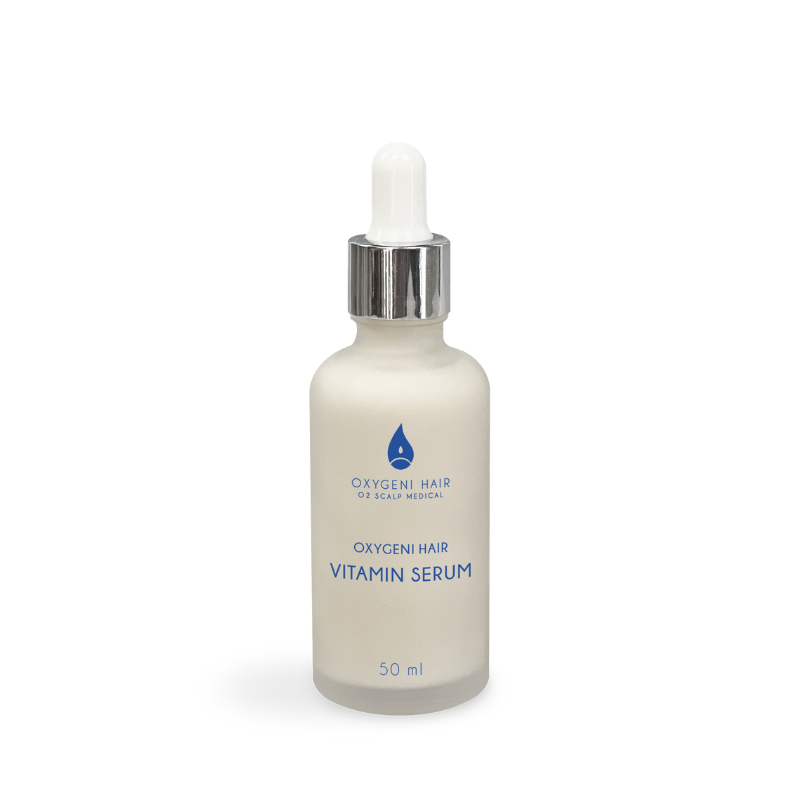
Vitamin Serum
The Vitamin Serum contains vitamins and minerals that are most needed to maintain the beauty of hair and skin. A, B, C, E vitamins and red grape antioxidant-containing hair growth serum replenishes the skin and its deep structure, revitalizing it, stimulating hair follicles and skin cells, and strengthens the skin's resistance and immunity.
If you need help with developing your hair care routine or want comprehensive advice on treating your hair loss from our hair specialists, Contact us!
We are here to help you!
However, hair loss treatment does not necessarily depend solely on hair care! If you feel that your hair loss is likely to be psychological, mental problems such as stressand , emotional problems are behind it, a kinesiologist, homeopathor , coach can also help you overcome your problem (and your hair loss)!
OXYGEN THERAPY AND OXYGENI HAIR PRODUCT REVIEWS
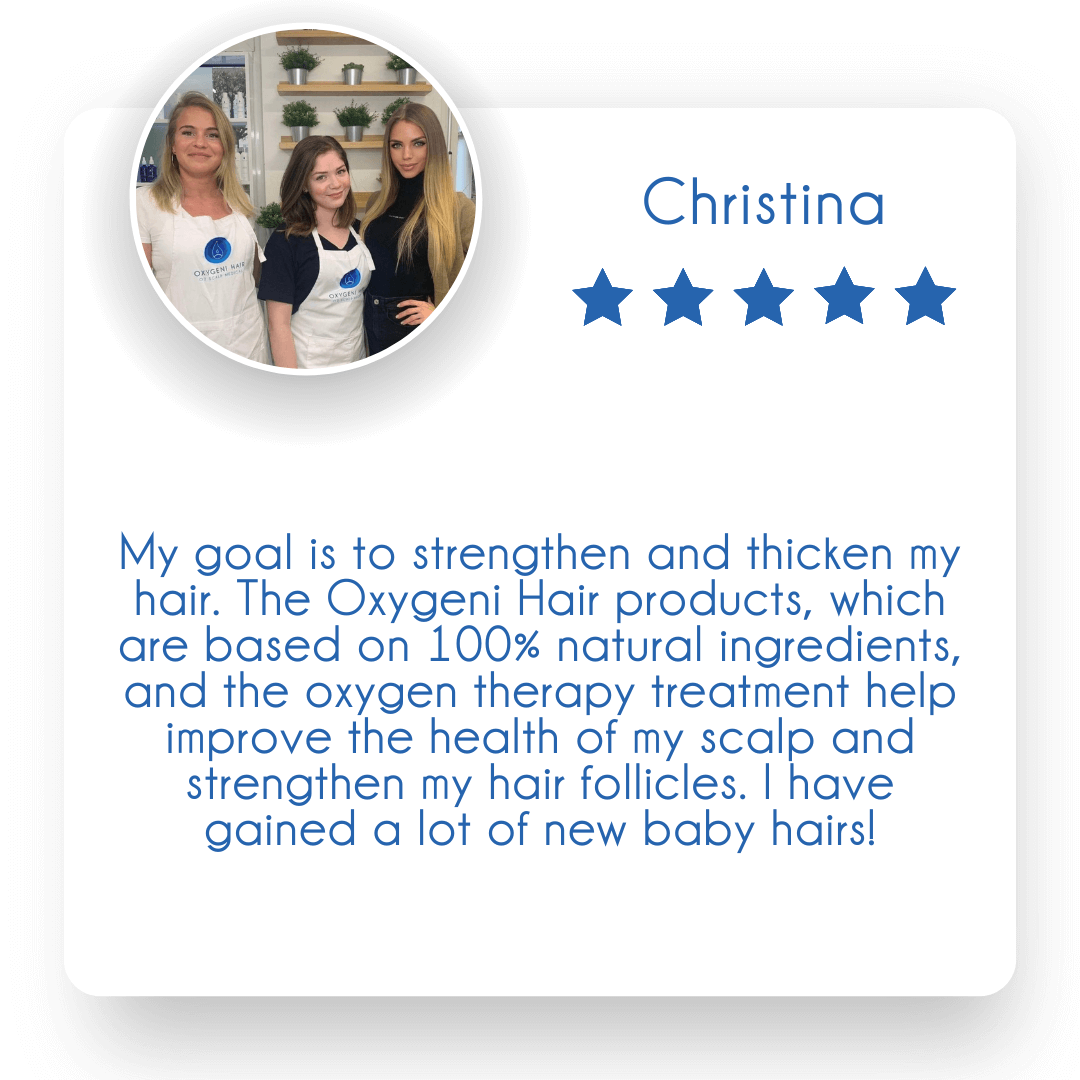

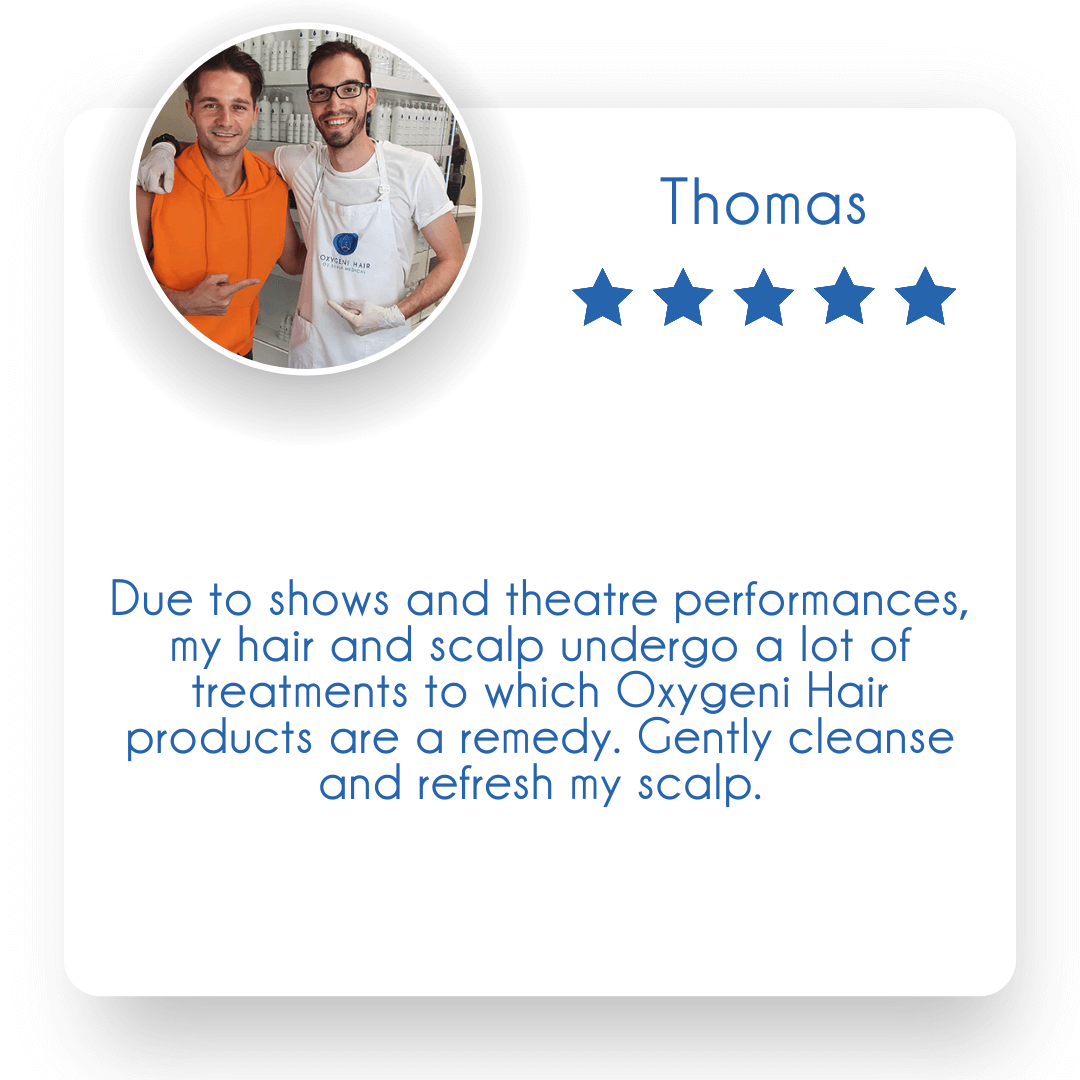
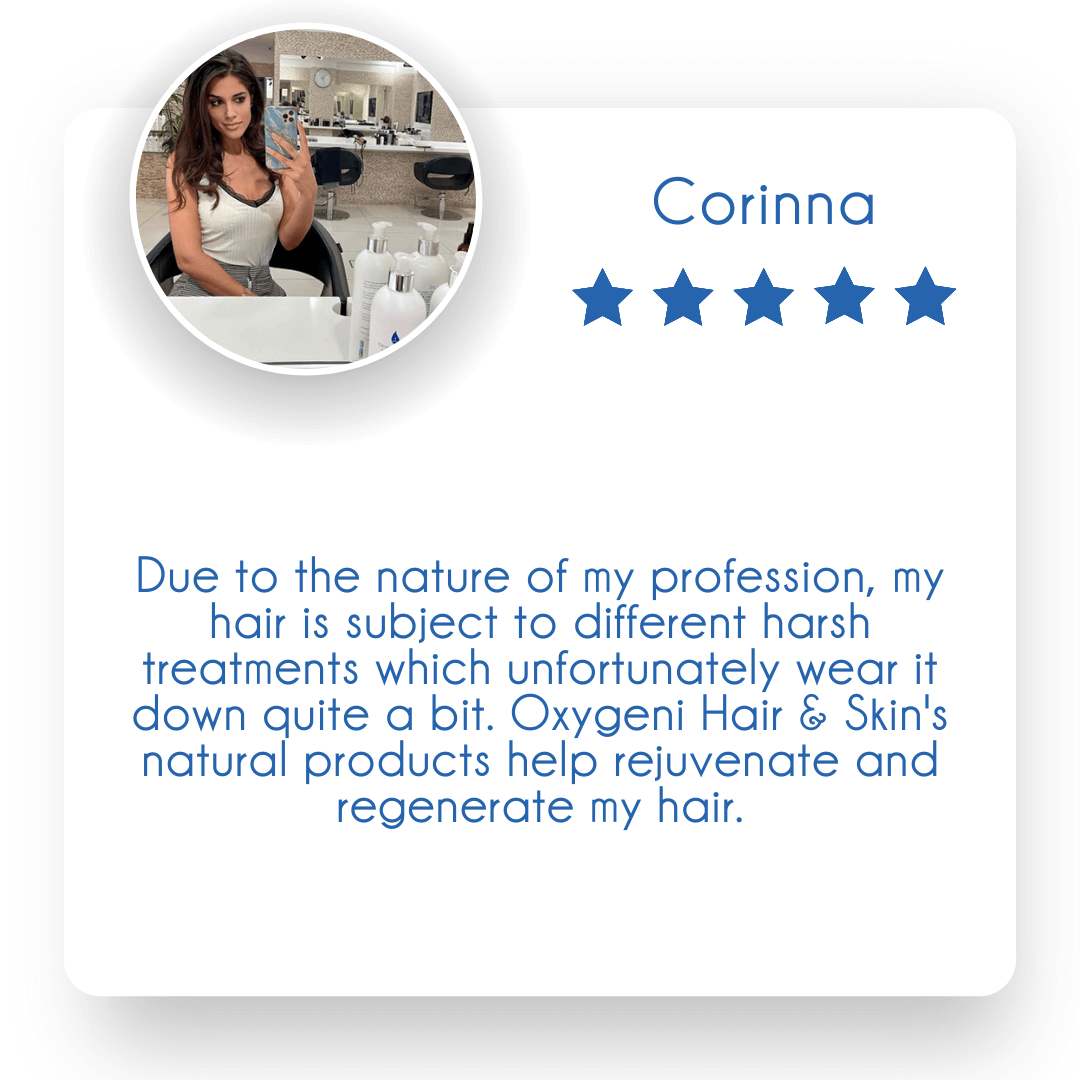
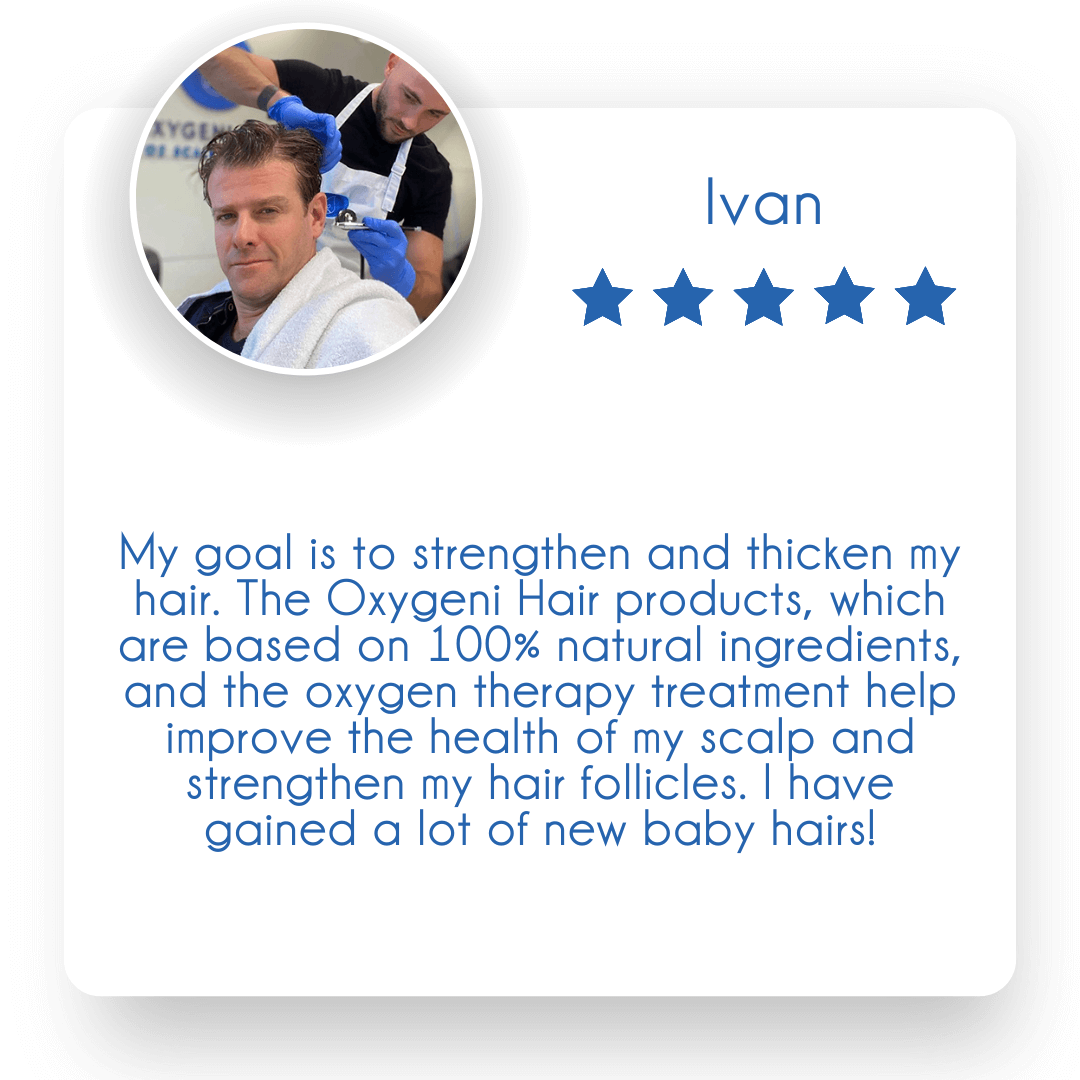
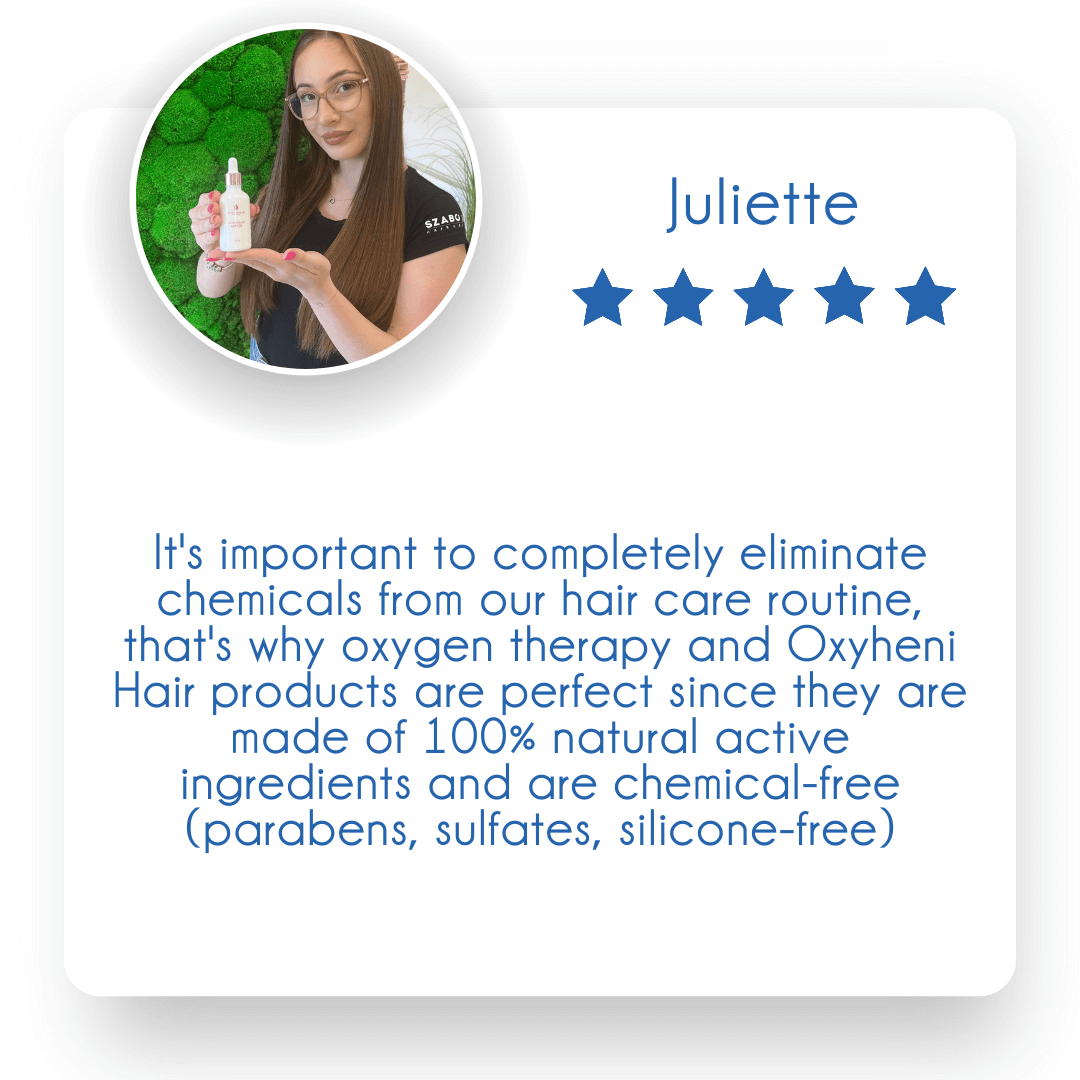
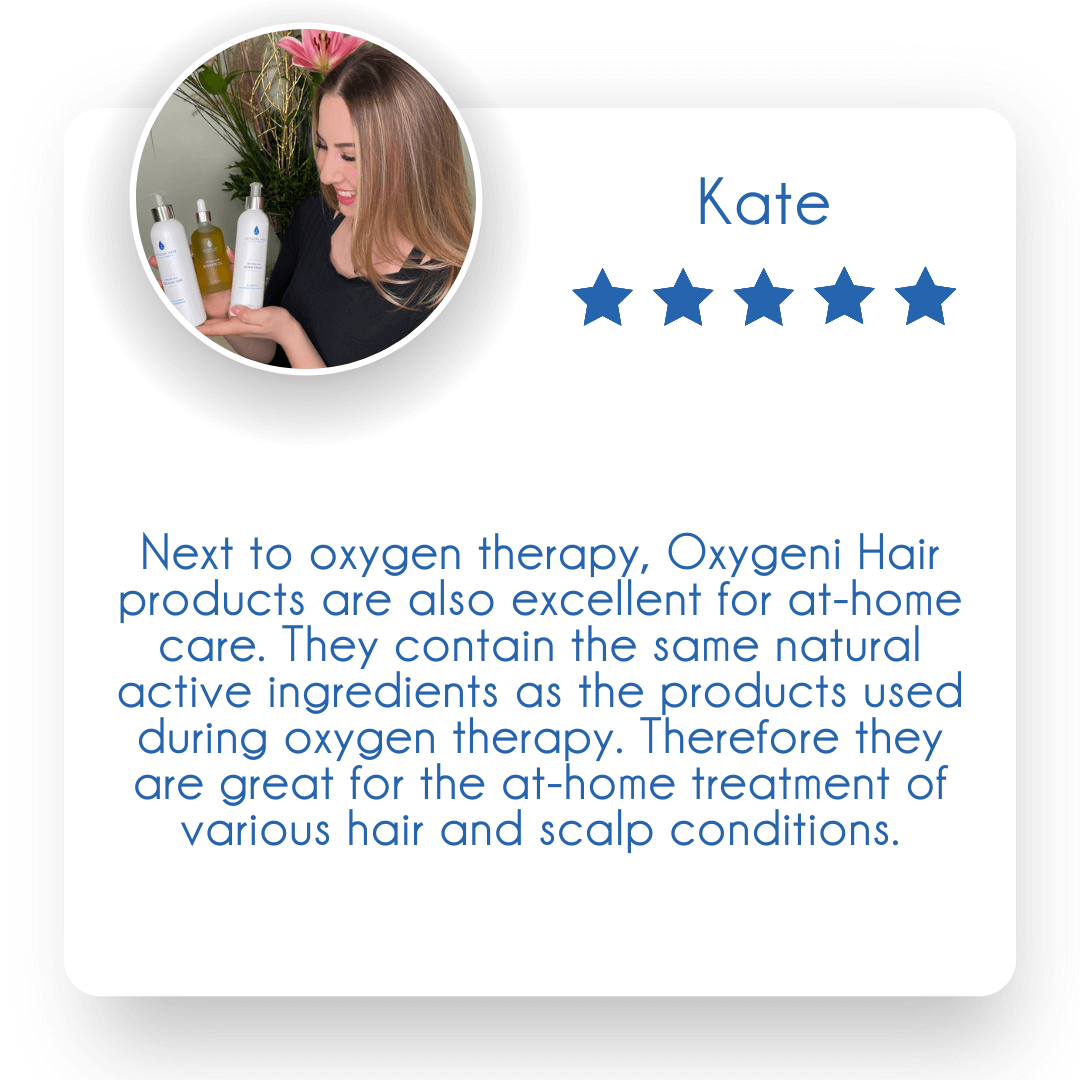
Follow us on our social media platforms!
